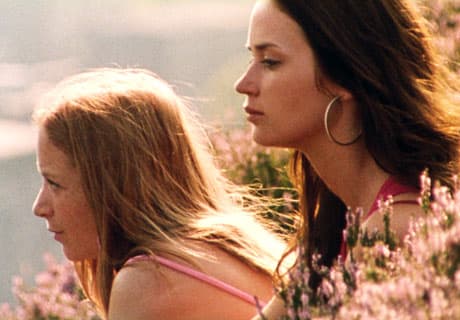Mona (newcomer Natalie Press) is a bored 16-year-old blonde living in a grey English town. Her boyfriend screws her in the backseat of his car then dumps her. Mona goes home and discovers her older brother, Phil (the reliable Paddy Considine), pouring booze down the sink and turning their family's pub into a Christian prayer centre. This is how Mona's summer starts.
Her spirits rise when she meets Tasmin (Emily Blunt), a posh yet cynical brunette spending the summer in her parents' country house. Tasmin's parents are seldom around and her sister is dead from bulimia. Alone in the house and the surrounding Yorkshire countryside, the two girls have an affair; they create their own world, roaming the forests and tripping on 'shrooms in town. No one disturbs them, though Phil, a roughneck-turned-born-again, distrusts Tasmin after she tricks him into kissing her. Tasmin is a good actress, something Mona will learn.
My Summer of Love is neither romance nor kitchen sink drama; it lacks teenage angst. Though the central relationship is lesbian, homosexuality isn't the focus. My Summer of Love is more of a "rites of passage" drama told from Mona's point of view. Mona has no illusions in life: she drifts apart from her brother, can't stand this sleepy town and wants to escape a destiny of "husband and kids." Tasmin offers her an escape, but being rich and spoiled, Tasmin plays games with people. Tasmin enjoys illusion and Pawlikowski nicely conjures a hazy air of hallucination as the film progresses. (The handheld zoom close-ups are clumsy, however.)
Despite some light moments, the film has an unsettling undercurrent and the performances by the leads are strong. Acclaimed in Britain, My Summer of Love is an enigmatic yet solid film about trust, betrayal and growing up. (Alliance Atlantis)
Her spirits rise when she meets Tasmin (Emily Blunt), a posh yet cynical brunette spending the summer in her parents' country house. Tasmin's parents are seldom around and her sister is dead from bulimia. Alone in the house and the surrounding Yorkshire countryside, the two girls have an affair; they create their own world, roaming the forests and tripping on 'shrooms in town. No one disturbs them, though Phil, a roughneck-turned-born-again, distrusts Tasmin after she tricks him into kissing her. Tasmin is a good actress, something Mona will learn.
My Summer of Love is neither romance nor kitchen sink drama; it lacks teenage angst. Though the central relationship is lesbian, homosexuality isn't the focus. My Summer of Love is more of a "rites of passage" drama told from Mona's point of view. Mona has no illusions in life: she drifts apart from her brother, can't stand this sleepy town and wants to escape a destiny of "husband and kids." Tasmin offers her an escape, but being rich and spoiled, Tasmin plays games with people. Tasmin enjoys illusion and Pawlikowski nicely conjures a hazy air of hallucination as the film progresses. (The handheld zoom close-ups are clumsy, however.)
Despite some light moments, the film has an unsettling undercurrent and the performances by the leads are strong. Acclaimed in Britain, My Summer of Love is an enigmatic yet solid film about trust, betrayal and growing up. (Alliance Atlantis)
